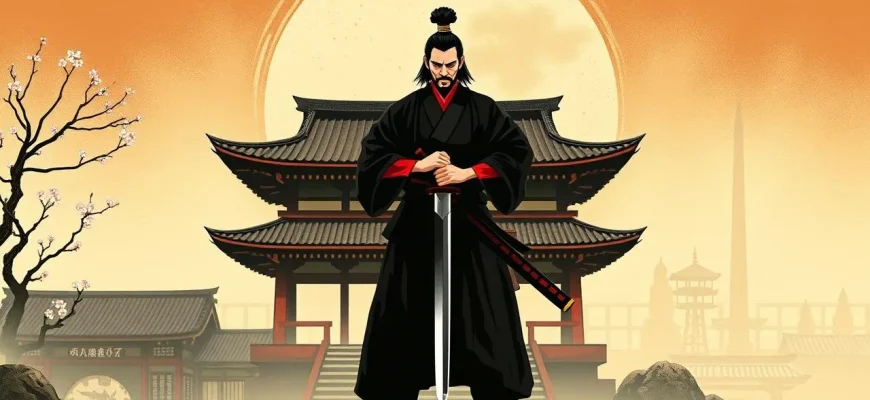Samurai films, or 'jidaigeki', offer a captivating glimpse into Japan's feudal past, where honor, duty, and the art of the sword reign supreme. This curated list of 10 samurai films not only showcases the rich tapestry of samurai culture but also provides a cinematic journey through time, exploring themes of loyalty, betrayal, and the clash between tradition and modernity. Whether you're a seasoned fan or new to the genre, these films promise to entertain and enlighten with their masterful storytelling and unforgettable characters.

Yojimbo (1961)
Description: Another Kurosawa classic, this film follows a ronin who arrives in a town controlled by two rival gangs, using his cunning and swordsmanship to play them against each other.
Fact: 'Yojimbo' directly inspired Sergio Leone's 'A Fistful of Dollars', which in turn influenced many Western films. The film's title translates to "Bodyguard" in English.
 Watch Now
Watch Now 
The Last Samurai (2003)
Description: This epic drama follows an American military officer who becomes embroiled in the samurai rebellion against the modernization of Japan, finding himself torn between his Western upbringing and the samurai code of honor.
Fact: The film was shot on location in Japan, with many scenes filmed at the historic Himeji Castle. Tom Cruise underwent extensive training in samurai swordsmanship for his role.
 Watch Now
Watch Now 
Ran (1985)
Description: Kurosawa's adaptation of Shakespeare's King Lear, set in medieval Japan, where an aging warlord divides his kingdom among his three sons, leading to betrayal and war.
Fact: 'Ran' took over 10 years to complete due to its massive scale and budget constraints. It was the most expensive Japanese film ever made at the time of its release.
 30 Days Free
30 Days Free 
Seven Samurai (1954)
Description: Akira Kurosawa's masterpiece about a village hiring seven masterless samurai to protect them from bandits, this film is often cited as one of the greatest films ever made, influencing countless other works in cinema.
Fact: The film was originally conceived as a three-part series, but Kurosawa decided to make it into one long film. It was also one of the first Japanese films to gain widespread international acclaim.
 30 Days Free
30 Days Free 
13 Assassins (2010)
Description: A remake of a 1963 film, this action-packed thriller follows a group of samurai who band together to assassinate a sadistic lord before he can seize power.
Fact: The film features an epic 45-minute battle sequence, which was meticulously choreographed and filmed over several weeks.
 30 Days Free
30 Days Free 
The Hidden Fortress (1958)
Description: This adventure film by Kurosawa, which inspired 'Star Wars', tells the story of two peasants who help a princess and her general escape from enemy territory.
Fact: George Lucas has cited this film as a major influence on 'Star Wars', particularly in its narrative structure and the use of two bickering characters akin to R2-D2 and C-3PO.
 30 Days Free
30 Days Free 
Samurai Rebellion (1967)
Description: A tale of honor and rebellion, where a samurai defies his lord to protect his daughter-in-law from an unwanted marriage, leading to a tragic confrontation.
Fact: The film was directed by Masaki Kobayashi, known for his critical views on Japanese society and authority, which are reflected in this film's themes.
 30 Days Free
30 Days Free 
Harakiri (1962)
Description: This film explores the themes of honor and hypocrisy through the story of a ronin who seeks to commit ritual suicide but reveals a deeper, more complex narrative.
Fact: The film was remade in 2011 by Takashi Miike, but the original remains a powerful critique of samurai culture and feudal ethics.
 30 Days Free
30 Days Free 
Sword of Doom (1966)
Description: A dark portrayal of a master swordsman whose skill is matched only by his moral decay, leading to a life of violence and isolation.
Fact: The film was based on a novel that was never completed, leaving the story open-ended, which adds to its enigmatic quality.
 30 Days Free
30 Days Free 
Twilight Samurai (2002)
Description: This film offers a more intimate look at samurai life, focusing on a low-ranking samurai who must balance his duties with his responsibilities to his family.
Fact: 'Twilight Samurai' won the Japanese Academy Award for Best Picture and was praised for its realistic portrayal of samurai life, contrasting with the often romanticized depictions in other films.
 30 Days Free
30 Days Free 








